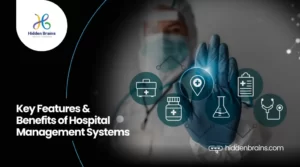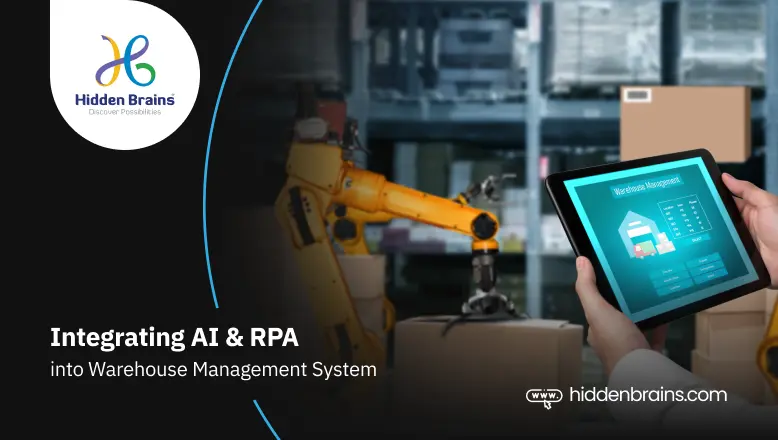Quick Summary
The healthcare industry has undergone a digital revolution, especially after the COVID-19 crisis exposed the limitations of manual systems. Hospitals today are adopting advanced Hospital Management Systems (HMS) to streamline operations, enhance patient care, and ensure data accuracy. This blog explores how HMS transforms healthcare management with automation, AI, and real-time analytics. From patient registration to billing, every process becomes faster, smarter, and paperless. Discover its key features, cost factors, and how Hidden Brains helps healthcare providers implement a secure, scalable, and efficient healthcare app.
Undoubtedly, hospital management systems have become a new hue for the healthcare industry since 2020 when things have drastically collapsed due to Covid-19.
Hospitals have witnessed the most ever panic situation of dealing with a large influx of patients with the paper-based system. The depressing part is that the system was inefficient in providing the actual overview of the systems in such an industry where every second is important.
Have you also realized this gap? If yes, then bridge it with our feature-rich Hospital Management System and deliver better care!
The good part is, that the healthcare industry has quickly realized this gap and bridged it by implementing a “Hospital Management System”.
Now the question is what exactly is a “Hospital management system and how it will help hospitals?”
Let’s get started with the basics…
Overview of Healthcare Management System and Its Market Hold
No matter whether it is a COVID healthcare crisis or managing everyday patients, delivering quality healthcare is one of the primary fundamental priorities for any hospital.
One of the basic things that Hospitals need to work on is to have a common system in place that strongly gathers all the healthcare requirements imposed by patients and accordingly connects doctors to meet those growing needs at the right time.
Now this calls for hospitals and healthcare providers operating private clinics to imbibe Hospital Management System into their business process that will not only help improve the quality of clinical care but also save many lives.

Understanding the Concept of Hospital Management System
“Hospital Management System is a software product suite designed to handle all aspects of a hospital’s operations ranging from managing patient’s data to tracking everyday transactions, handling administration to getting real-time analysis.”
Whether you are running a big hospital or a small size healthcare center, improving the efficiency and accuracy of your work will be a primary concern.
Managing the key processes and the entire system is critical to the success of a hospital’s ability to cater to the maximum number of patients – seamlessly and effectively. And that’s where implementing a Hospital management system is a worthy decision.
Market Stats and Facts Related To Hospital Management System (HMS)
If you’re still in a dilemma about whether hiring a mobile app developer to create a hospital management solution will be a worthy decision, then you need to check out the market hold of Hospital Management Solutions:
- It is expected that Hospital Management Solutions is expected to make a revenue of $62.17 billion by 2027.
- North America, Europe, Asia-Pacific, and the Middle East are the leading markets of HMS.
Though stats are inspiring enough for hospitals to look for the best healthcare IT solutions, before that it is worth understanding how it will empower hospitals and why do they look for Healthcare management solutions in 2024!
Let’s watch the quick video to know “Hospital Management Systems for Efficient Patient Care”
Hospital Management Systems for Efficient Patient Care
Hospital Management System: Adopting New Technology Trends to Empower the Healthcare Industry
With increasing healthcare costs in recent times, there is a requirement to manage the information that health professionals need. Not only do Hospitals need a strong and efficient management team; with a lot of decision-making at every step along with the precision of the implementation of the managerial process, traditional processes of hospital management can be very critical and tedious.
This calls for the need to have a proper system that can manage everything all by itself. The processes can be automated and digitized and ensure a highly accurate flow of information.
Such systems can help to make your workflow easier and more convenient. One of the prime purposes of the Hospital Management System is to make hospital management easy and paperless.
Apart from this, here are some Top Technology Trends that Hospital Management Systems can leverage to benefit healthcare service providers…
1. AL and ML Algorithms to Streamline Workflow and Automation
The well-planned hospital management systems can reduce turnaround time in patient care by streamlining workflows and incorporating automation using AI and ML capabilities.
Using AI algorithms, hospitals can identify repetitive tasks and able to automate the workflow by integrating AI-powered chatbots. According to McKinsey, 33% of healthcare providers’ tasks are likely to be automated with intelligent bots.
This ensures improved services, quick access to data, and automation the repetitive tasks.
2. Blockchain Technology for Centralized Control and Coordination

Administrative operations are more effectively centralized and coordinated with the implementation of blockchain technology hospital management systems. Using the Blockchain ledger, the hospital can get a centralized platform where they can get access to their entire data.
This centralized control enhances overall efficiency and facilitates better resource allocation.
3. Enhanced Services for Patients
The best benefits of using hospital management solutions are you can offer 24/7 customer support to patients, automate appointment booking, access medical records on the go, and able to set timely reminders. All you need is to hire a top mobile app development company to customize the HMS with these features.
Additionally, many hospitals now integrate HIPAA-compliant patient communication platforms like Textline to enhance these services. Such tools enable healthcare teams to send secure appointment reminders, follow-up instructions, test updates, and real-time support messages directly to patients’ phones, reducing manual coordination, lowering no-show rates, and improving the overall patient experience.
4. Secured IT Infrastructure
Data security is one of the biggest challenges that hospitals always come across. However, healthcare management software ensures the protected movement of patient data as they follow an encrypted policy.
5. Big Data for Quick Access to Patient Data
Using Big Data in Healthcare software development enables easy recording, maintenance, and quick access to patient data across different treatment cycles.
For this, the healthcare industry is proactive using IoT-connected devices to gather patient data and get real-time insights into their health which ultimately helps cut down hospital visits.
6. Cost-Effectiveness
Robust hospital management systems offer significant cost benefits by reducing administrative overhead and optimizing resource allocation. With AI technology, most of the tasks can be automated which in turn results in cost-effectiveness.
7. Error Reduction in Medical Information
Hospital management software works automatically, therefore contributing to reducing errors in medical information by providing real-time and accurate patient data. This accuracy is crucial for ensuring the delivery of high-quality healthcare services.
8. Intelligent Analytics for Better Decision-Making
Hospital administration gains better insights through detailed reports and analytics provided by management systems. It helps in making informed decisions backed by data and contributes to proactive issue tracking, resolution, and continuous improvement.
All-in-all, the adoption of hospital management systems empowers healthcare service providers by enhancing efficiency, improving patient services, ensuring data security, and facilitating intelligent decision-making.”
If you are all set to build a hospital management software for your hospital or clinic, but not sure what type of software you will be needing and what features do you need to implement, then you need to quickly jump on the next section.

Get Insights into your business with our Hospital Administration Management system!
Important Features of Hospital Management System
The success of any app is majorly dependent upon the features and functionalities of the app. Moreover, they are the biggest budget-draining element of the app. So when it comes to implementing the Hospital Management System, make sure you prioritize the app features smartly.
Though you can hire a top software development company that helps you customize the app with top features and functionalities, but still here we have provided an overview of all the important features that an HMS should have.
Let’s get started with the list of features for the Hospital Management System:
- Patient Registration and Management: With this features in the healthcare management system, hospitals can easily gather and manage patient demographics, contact information, and medical history without any errors and the risk of data loss.
- Appointment Scheduling: Becomes easier for employees to efficiently schedule and manage appointments for patients as per the availability of doctors for certain lots..
- Electronic Health Records (EHR): Maintain digital health records, including diagnoses, treatments, and test results, and able to access them anytime.
- Billing and Invoicing: Streamline billing processes with an automated invoice-generating feature that helps in managing financial transactions.
- Prescription Management: Create, store, and manage digital prescriptions issued by healthcare providers all in HMS.
- Laboratory Information System (LIS): Integrate lab test requests, results, and diagnostics into the system without any risk of data leaks.
- Inventory Management: Monitor and manage medical inventory, ensuring availability of supplies and medications.
- Electronic Medical Billing (e-Billing): Facilitate electronic billing processes for insurance claims and reimbursement.
- Radiology Information System (RIS): Integrate and manage radiological images and reports efficiently.
- Patient Portal: Enable patients to access their health records, schedule appointments, and communicate with healthcare providers.
- Therapy Management Software: Manage therapeutic services including physical therapy, speech therapy, and counseling sessions with integrated scheduling, documentation, and progress tracking.
- Staff and User Management: Manage user roles and permissions for different staff members within the system.
- Ward and Bed Management: Optimize the allocation and management of hospital wards and beds.
- Mobile Access and Compatibility: Ensure compatibility with mobile devices for on-the-go access to information.
- Security and Compliance: Implement robust security measures to protect patient data and ensure compliance with healthcare regulations.
- Integrated Telemedicine Module: Facilitate virtual consultations and telemedicine services for remote patient care.
- Dashboard and Reporting Tools: Provide comprehensive dashboards and reporting tools for real-time insights into hospital operations.
- Automated Reminders and Notifications: Send automated reminders for appointments, medication, and follow-ups to patients.
- Healthcare Analytics: Utilize data analytics to derive insights into patient outcomes, resource utilization, and operational efficiency.
- Document Management System: Digitally manage and store documents such as consent forms, medical reports, and insurance information.
- Emergency Management and Alerts: Implement features to handle emergencies, and send alerts to relevant staff members.
- Pharmacy Management: Streamline pharmacy operations, manage medication dispensing, and maintain drug inventory.
- Patient Feedback and Satisfaction Surveys: Collect feedback from patients to assess satisfaction levels and improve service quality.
- Collaboration Tools: Facilitate communication and collaboration among healthcare providers, ensuring seamless patient care.
These are the few general features of the hospital management system but it can be enhanced if you are looking for advanced app versions. But one such question that has been aligned with this is “How much does it cost to build a healthcare management software in 2024”?
Let’s get into it!
Read More: Top AI Development Trends in 2024 That Will Reshape the World
How Much Does It Cost to Build a Hospital Management System?
The average cost to build a Hospital Management system can vary from $15,000* to $25,000*+ depending upon various factors. So when you estimate the cost to build a healthcare managenet software, what factors are actually contributing to the price calculation?
So here are the few major cost-driving factors that you need to understand while estimating the hospital management system cost:
- Complexity of the software: Decide whether you are looking for a basic app version or a solution with advanced features with AI chatbot, ML, and Big Data for data gathering and record keeping and more. The average cost of a basic solution will be approximately $15,000* to $17,000*+ whereas the advanced version may go up to $25000*+.
- UI/UX Design: The simple app interface of the hospital management system is always easy to access and easy to navigate. In addition, you need to hire an app developer with basic knowledge of app designing in case you prefer staying with a simple design which ultimately comes with an affordable hourly cost ranging between $15* to $25*.
- App Development Team: To build a hospital management system, basically you need to hire a software development company that provides access to complete teams including project managers, Backend/frontend developers, UI/UX designers, app testers, and more.
So these are the major cost-influencing factors. If evaluating the final app development cost based on these parameters, then it will turn out between $15,000* to $25,000*.
Rest before you take these estimations as a final cost, it is worth understanding that there is no standard cost and product fit to all business needs.
Every business is different, so there requirements are different. To get more clear estimations, it is always suggested to book a free consultation slot with experts for detailed discussion.

Innovation starts with code.
Improve efficiency with our smartly designed Hospital Management Solutions!How Does Hidden Brains Help You With Hospital Management System?
The Hospital Information Management System (HIMS) is a revolutionary product from the Hidden Brain Product development team. An error-free hospital information management software (HIMS) that is crafted with automated features like generating analytical reports to get an overview of hospitals, clinics, and more.
It is designed for small, mid, and large hospitals, clinics, individual doctors, and Multi-specialty hospitals. Using advanced technologies in the Hospital Management System, healthcare service providers can make effective decisions for patient care, hospital management, and administration.
Feature-rich HIMS covers all the aspects of hospital management and helps the doctors and staff members manage and administrate a hospital or clinic efficiently and effectively.
To learn more about our pattern of working and what approach we implemented, you can check out the case studies of Hidden Brains.
Frequently Asked Questions
So this is our frequently asked question section where we have covered all the common questions that our clients may ask while looking for hospital management solutions.
Can Hospital Management Solutions be Customized?
Certainly. Hidden Brains customizes Hospital Management Solutions to match the specific workflows and requirements of each hospital, ensuring a tailored fit and adherence to budget constraints.
What Security Measures Protect Patient Data in Hospital Management Solutions?
To ensure high-end data security and put client privacy on priority, Hidden Brains implements robust security measures, including advanced data encryption, secure access protocols, and strict compliance with healthcare regulations such as HIPAA.
What Type of Hospital Management Solutions Do You Need To Develop?
The popular types of hospital management solutions available to adopt may include:
– Modules for patient registration,
– Appointment scheduling and booking,
– Module to maintain electronic health records (EHR),
– For billing and invoicing,
– For prescription management,
– Laboratory information system (LIS) integration,
– Inventory management, and more.
Rest the choice of Hospital Management Solution is depending upon your specific needs, budget, and challenges that you may have come across.
What Type of Data Do Hospital Management Solutions Handle?
Hospital management solutions are designed to handle a wide range of data, including:
– Patient demographics
– Medical history
– Appointment schedules
– Electronic health records (EHR)
– Billing and invoicing information
– Prescription details
– Laboratory test results
– Inventory data, and more.
The advanced version of Hospital Management Systems handles the huge amount of data that ultimately allow the system to streamline hospital operations and enhance patient care.
Who All Can Consider Implementing Hospital Management System?
Hospital management systems has now become a priority for all healthcare establishments. Hospitals, nursing homes, dispensaries, outpatient clinics, rehabilitation centers, pathology laboratories, etc. should surely think of incorporating such systems to provide better patient care and streamline the processes.
Conclusion
The healthcare industry is rapidly evolving and keeping up with the latest hospital management systems has not remained an option but an urgent need for hospitals. With these Healthcare management solutions, hospitals can streamline operations, keep track of finances, reduce costs, eliminate errors, and more.
But if you wondering how a standard HMS will fit your business needs, then don’t worry Hidden Brains is here to become your strategic project development partner who has all the proficiency in customizing healthcare solutions for clinics, hospitals, rehabilitation centers, and more.
For more details and software specifications, you can drop a query or contact us!































































































![Sales & Distribution [Oil & Gas] Sales & Distribution [Oil & Gas]](https://www.hiddenbrains.com/blog/wp-content/themes/blankslate/assets/images/sales_and_distribution-icon.74d08193.svg)

![Fluid Terminal Management [Oil & Gas] Fluid Terminal Management [Oil & Gas]](https://www.hiddenbrains.com/blog/wp-content/themes/blankslate/assets/images/fluid_terminal_management-icon.4b3a27a4.svg)































![Sales & Distribution [Oil & Gas] Sales & Distribution [Oil & Gas]](https://www.hiddenbrains.com/blog/wp-content/themes/blankslate/assets/images/sales_and_distribution-icon.74d08193.svg?1.0.0)
![Fluid Terminal Management [Oil & Gas] Fluid Terminal Management [Oil & Gas]](https://www.hiddenbrains.com/blog/wp-content/themes/blankslate/assets/images/fluid_terminal_management-icon.4b3a27a4.svg?1.0.0)
























































































































































































